|
|
|
Sort Order |
|
|
|
Items / Page
|
|
|
|
|
|
|
| Srl | Item |
| 1 |
ID:
092313
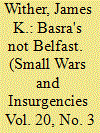

|
|
|
|
|
| Publication |
2009.
|
| Summary/Abstract |
This article examines British Army operations in Iraq. It focuses on the causes of the army's apparent failure to live up to its reputation for the conduct of small wars. The paper discusses the British experience of small wars in the context of Iraq, the influence of doctrine and strategy, and the political and moral factors that shaped the army's performance. The paper's conclusions suggest that the Iraq War may cause a significant reappraisal, not just of military doctrine and strategy, but also of Britain's role in future small wars.
* The opinions expressed in this article are those of the author and do not necessarily reflect the official policy or position of the George C. Marshall Center, the government of the United States of America or the Federal Republic of Germany.
|
|
|
|
|
|
|
|
|
|
|
|
|
|
|
|
| 2 |
ID:
092310
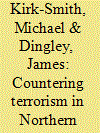

|
|
|
|
|
| Publication |
2009.
|
| Summary/Abstract |
This article aims to review some of the key lessons learnt by the Royal Ulster Constabulary's (RUC) Special Branch in the 37 years of the troubles in Northern Ireland. Above all counter-terrorism is an intelligence led operation and Special Branch are the key agency for this in all UK police forces, who have now benefited enormously from the expertise that the RUC's Special Branch built up over the years and have passed on to their colleagues throughout the UK. Intelligence is more often than not a human role and relies on human agencies, which was the case in Northern Ireland. The bulk of intelligence gathering was carried out at quite low levels although the sifting and analysing of it became a more specialist skill. Electronic intelligence and computerised systems were often quite low down in the order of priorities and uses, which tends to confound popular impressions. Agents, informers and good old fashioned 'coppers' who knew their patch were much more important both in terms of gathering information and in terms of undermining the terrorists morale from within and it was these factors that fundamentally defeated the IRA in Northern Ireland.
|
|
|
|
|
|
|
|
|
|
|
|
|
|
|
|
| 3 |
ID:
092306


|
|
|
|
|
| Publication |
2009.
|
| Summary/Abstract |
The Christian resistance to the Arab invasion of Spain in 711 tends to be glossed over as a sideshow in what is usually presented as the inexorable progress of the conquest. This reflects the bias of our meagre sources, which mostly take the Arab perspective. Nevertheless, with close consideration and careful handling of these sources, we can draw from them an impression of a persistent insurgency that presented a real problem to the Islamic authorities and induced them to take both political and military countermeasures. This paper suggests how the resistance formed, its organization and tactics, and why the Arabs were unable to suppress it.
|
|
|
|
|
|
|
|
|
|
|
|
|
|
|
|
| 4 |
ID:
092304
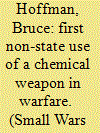

|
|
|
|
|
| Publication |
2009.
|
| Summary/Abstract |
This article presents research conducted by the author in Sri Lanka to verify the first non-state use of a chemical weapon in warfare. This 1990 incident involved a primitive chemical attack perpetrated by the Liberation Tigers of Tamil Eelam (the LTTE or Tamil Tigers) on a Sri Lankan Armed Forces (SLAF) encampment in East Kiran, in the Batticaloa district of Sri Lanka. The article first describes the incident itself, before providing a brief description of the LTTE, its background, and the influence of its leader, Velupillai Prabhakaran. The article then analyzes the attack and places it within the context of theories about potential terrorist and insurgent use of unconventional weapons, such as chemical warfare agents. The research reported here is of interest not only because of the unique, opportunistic dimension of the attack, but also because its conclusions challenge the conventional wisdom about likely terrorist and insurgent use of these unconventional weapons and sheds new light on their interest and intentions in employing such weapons and tactics.
|
|
|
|
|
|
|
|
|
|
|
|
|
|
|
|
| 5 |
ID:
092312


|
|
|
|
|
| Publication |
2009.
|
| Summary/Abstract |
In the Post-Bipolar Era the growing complexity of the military operations requires a new approach for the resolution of international crises. Since the end of the Cold War, peace support operations (PSO) have become the mainstay and principal occupation of most Western armies. At the same time, Italy has been one of the most important actors in such an area. The article focuses on the cooperation between military and civil components (a process called CIMIC) as a key variable in the Italian PSOs. We will analyse in detail the main lessons learned from past military interventions as well as the general context in which new tendencies are taking place. The maintaining of a minimum security frame becomes essential to fulfil activities 'collateral' to the mission: reconstructing services and infrastructure, food distribution, water and medication, law and order, de-mining, training of local forces, and supporting local institutions. These are the main tasks to obtain thrust and support from the population.
|
|
|
|
|
|
|
|
|
|
|
|
|
|
|
|
| 6 |
ID:
092311
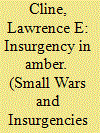

|
|
|
|
|
| Publication |
2009.
|
| Summary/Abstract |
Multiple ethnic insurgencies have existed in Myanmar since independence. The military junta's response has been extremely brutal at the tactical level, but has shown some political astuteness at the strategic level, with a series of ceasefires with most of the ethnic groups. Despite these ceasefires - most of which have resulted in the continued existence of quasi-independent armed groups - other ethnic movements have continued their armed operations. The overall strategic picture is one of stalemate, with the ethnic movements continuing to exist, but with few realistic prospects of expanding their operations.
|
|
|
|
|
|
|
|
|
|
|
|
|
|
|
|
| 7 |
ID:
092307
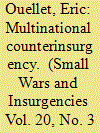

|
|
|
|
|
| Publication |
2009.
|
| Summary/Abstract |
This article proposes a case study of the multinational counterinsurgency operations that occurred in China during the Boxer Rebellion in 1900-1, to provide a better understanding of the political and military dynamics specific to this type of mission. The study focuses primarily on the nature of the cooperation on the ground, the various national approaches to counterinsurgency, and the asymmetry of strategic approach between the Westerners and the Chinese. A discussion is also proposed, highlighting that combined counterinsurgency is not per se an obstacle to the unity of command, but that politically international coalitions create unique challenges to counterinsurgency operations.
* Views and opinions expressed in this text are those of the author and do not represent, or otherwise reflect, any official opinion or position of the Department of National Defence or the Government of Canada. Reproduced with permission of the Department of National Defence, Government of Canada.
|
|
|
|
|
|
|
|
|
|
|
|
|
|
|
|
| 8 |
ID:
092308
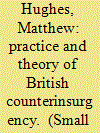

|
|
|
|
|
| Publication |
2009.
|
| Summary/Abstract |
This article details two largely unreported atrocities by British forces operating against Arab rebels during the Arab revolt, 1936-9, at the Palestinian villages of al-Bassa and Halhul. It then examines the military-legal system that underpinned and authorised British military forces operating in aid of the civil power, suggesting that the law in place at the time allowed for a level of reprisals and punitive actions, such as happened at al-Bassa and Halhul. The article does not conclude that the law allowed for atrocities but it does argue that it gave a basic form and understanding to an operational method that was brutal and could lead to atrocities. It thus tests the idea in much of the literature on counterinsurgency that the British were restrained and used minimum force when compared to other colonial and neo-colonial powers fighting insurgents.
|
|
|
|
|
|
|
|
|
|
|
|
|
|
|
|
| 9 |
ID:
092315


|
|
|
|
|
| Publication |
2009.
|
| Summary/Abstract |
This paper draws on two academic articles that highlight the need to resolve the violence of 'spoilers', i.e. armed political factions that could spoil a negotiated end to conflict. They both make interesting contributions within their own field of peacekeeping literature but we think that their proposed agenda, which is the study of 'spoilers', can be improved with the incorporation of Axel Honneth's 'Recognition Theory'. While we do not wade into the deeper debate about recognition theory, we think that the basic tenets of this theory can help improve the analysis of spoiler theory and, consequently, the prescriptions for its usage in the context of resolving ongoing violence in Iraq. Based on our own rereading of 'spoiler theory' we will argue for the benefits of incorporating informal negotiations into the formalised debate that is currently taking place in Iraq's political institutions.
|
|
|
|
|
|
|
|
|
|
|
|
|
|
|
|
| 10 |
ID:
092314
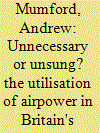

|
|
|
|
|
| Publication |
2009.
|
| Summary/Abstract |
Making extensive use of primary archival documents, this article seeks to explore whether airpower in three of Britain's most significant post-war colonial counterinsurgency campaigns, Malaya, Kenya and South Arabia, was an unnecessary part of British strategy, offering little useful military force due to the futility and strategic damage rendered by offensive bombardment, or whether airpower was indeed an unsung factor that provided operational flexibility through its effectiveness in a supply context, as well as its intelligence role in providing valuable aerial reconnaissance. In all three case studies the role played by the RAF in medical evacuations, in troop drops, in crop spraying during food-denial initiatives, and in providing 'Voice Aircraft' for the propaganda campaign, provide insights into an under-explored component of Britain's politico-military efforts in counterinsurgency in the 1950s and 1960s and suggests that the main strategic value of airpower in counterinsurgency, then and now, lies in its non-kinetic functions.
|
|
|
|
|
|
|
|
|
|
|
|
|
|
|
|
|
|
|
|
|